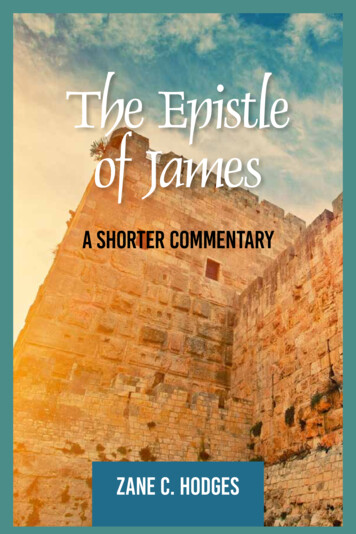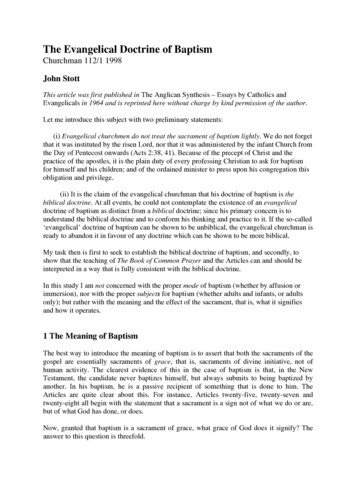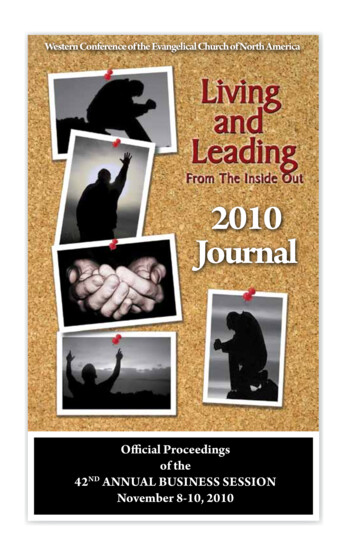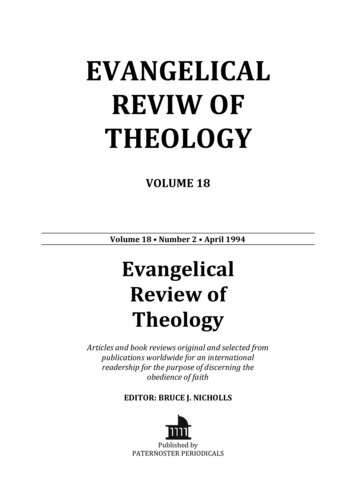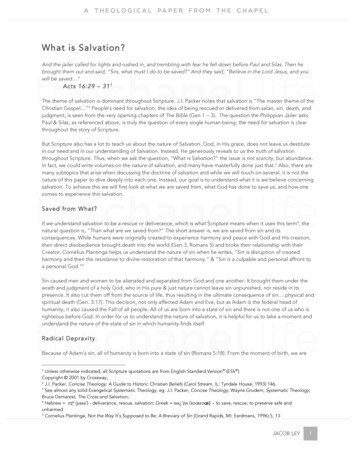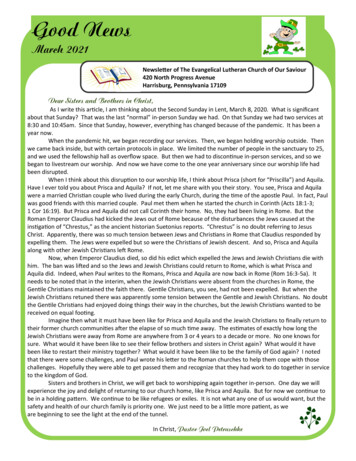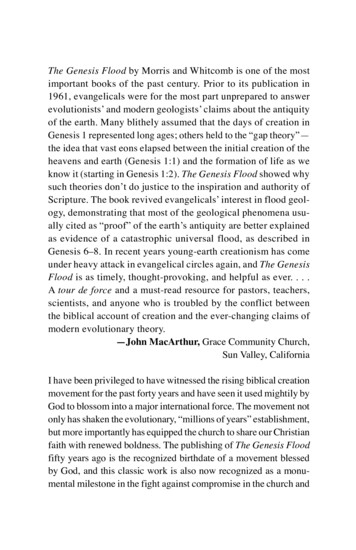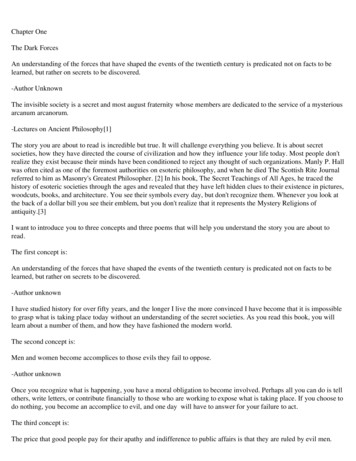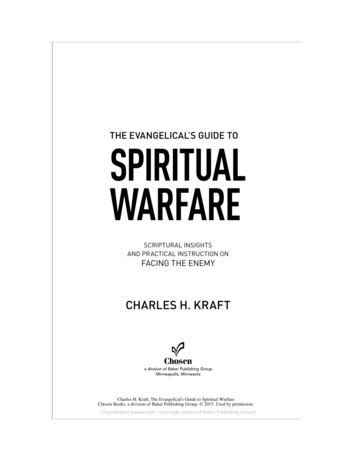
Transcription
THE EVANGELICAL’S GUIDE TOSPIRITUALWARFARESCRIPTURAL INSIGHTSAND PRACTICAL INSTRUCTION ONFACING THE ENEMYCHARLES H. KRAFTGCharles H. Kraft, The Evangelical's Guide to Spiritual WarfareChosen Books, a division of Baker Publishing Group, 2015. Used by permission.(Unpublished manuscript—copyright protected Baker Publishing Group)Kraft GuideSpiritualWarfare NS kf.indd 512/15/14 8:25 AM
2015 by Charles H. KraftPublished by Chosen Books11400 Hampshire Avenue SouthBloomington, Minnesota 55438www.chosenbooks.comChosen Books is a division ofBaker Publishing Group, Grand Rapids, MichiganPrinted in the United States of AmericaAll rights reserved. No part of this publication may be reproduced, stored in a retrieval system,or transmitted in any form or by any means—for example, electronic, photocopy, recording—without the prior written permission of the publisher. The only exception is brief quotations inprinted reviews.Library of Congress Cataloging-in-Publication DataKraft, Charles H.The evangelical’s guide to spiritual warfare : scriptural insights and practical instruction on facing the enemy / Charles H. Kraft.pages cmIncludes bibliographical references and index.Summary: “A seminary professor and former missionary offers an accessible, comprehensive resource to help readers lay aside doubts and embrace a biblical, balanced approach to spiritual warfare”— Provided by publisher.ISBN 978-0-8007-9615-0 (pbk. : alk. paper)1. Spiritual warfare. 2. Evangelicalism. I. Title.BV4509.5.K685 20152014041706235 .4—dc23Portions of this book were previously publishedby the author and adapted for this book withpermission. The portions revised and adaptedfor this book include: Charles H. Kraft, Confronting Powerless Christianity: Evangelicalsand the Missing Dimension, 46–62, 71–72,115–137, 180–186, 192–233; Charles H. Kraft,“‘Christian Animism’ or God-Given Authority?” in Spiritual Power and Missions: Raisingthe Issues, ed. Edward Rommen, EvangelicalMissiological Society Series, no. 3, 92–94,103–106, 117–120, 123–132; Charles H. Kraft,Defeating Dark Angels: Breaking Demonic Oppressions in the Believer’s Life, 33–64, 94–107,151–172; and Charles H. Kraft, I Give You Authority: Practicing the Authority Jesus Gave Us,rev. ed., 43–48, 307–329. Full publication detailsof all titles in bibliography.Unless otherwise indicated, Scripture quotations are from the Good News Translation—Second Edition. Copyright 1992 by AmericanBible Society. Used by permission.Scripture quotations identified nasb are fromthe New American Standard Bible , copyright 1960, 1962, 1963, 1968, 1971, 1972, 1973,1975, 1977, 1995 by The Lockman Foundation.Used by permission.NIV . Copyright 1973, 1978, 1984, 2011 byBiblica, Inc. Used by permission of Zondervan. All rights reserved worldwide. www.zondervan.comScripture quotations identified nkjv are fromthe New King James Version. Copyright 1982by Thomas Nelson, Inc. Used by permission.All rights reserved.Scripture quotations identified nlt are from theHoly Bible, New Living Translation, copyright 1996, 2004, 2007 by Tyndale House Foundation. Used by permission of Tyndale HousePublishers, Inc., Carol Stream, Illinois 60188.All rights reserved.Scripture quotations identified Phillips arefrom The New Testament in Modern English, revised edition—J. B. Phillips, translator. J. B. Phillips 1958, 1960, 1972. Used bypermission of Macmillan Publishing Co., Inc.Scripture quotations identified tlb are fromThe Living Bible, copyright 1971. Used bypermission of Tyndale House Publishers, Inc.,Wheaton, Illinois 60189. All rights reserved.To protect the privacy of those who have sharedtheir experiences with the author, details andnames have been changed.Scripture quotations identified niv are fromthe Holy Bible, New International Version .Cover design by LOOK Design Studio154 316 17 181920 2176 52 1Charles H. Kraft, The Evangelical's Guide to Spiritual WarfareChosen Books, a division of Baker Publishing Group, 2015. Used by permission.(Unpublished manuscript—copyright protected Baker Publishing Group)Kraft GuideSpiritualWarfare NS kf.indd 612/15/14 8:25 AM
I dedicate this book to my friend and mentor John Wimber,in gratefulness to God for the miracle that He performedthrough John in leading this evangelical into a powerfulversion of Christianity. As a lifelong evangelical, I enjoyedmy relationship with Jesus. But I always felt that there wasmore to Christian faith than I was experiencing. Listeningto John and seeing how God used him did the trick. I havenot been the same since January 1982, when God usedJohn to change my worldview and then to change mypractice. We all miss John, but I will never stop praisingGod for bringing him across my path.Charles H. Kraft, The Evangelical's Guide to Spiritual WarfareChosen Books, a division of Baker Publishing Group, 2015. Used by permission.(Unpublished manuscript—copyright protected Baker Publishing Group)Kraft GuideSpiritualWarfare NS kf.indd 712/15/14 8:25 AM
Charles H. Kraft, The Evangelical's Guide to Spiritual WarfareChosen Books, a division of Baker Publishing Group, 2015. Used by permission.(Unpublished manuscript—copyright protected Baker Publishing Group)Kraft GuideSpiritualWarfare NS kf.indd 812/15/14 8:25 AM
ContentsForeword by Stephen A. Seamands 11Acknowledgments 13Introduction 15Part 1: Introduction to Spiritual Warfare1. A Concern for Spiritual Warfare 212. Issues in Spiritual Warfare 29Part 2: The Perspective3. Principles of Interpretation 434. Our Power and Authority 53Part 3: Worldview Blockage5.6.7.8.Our Problem as Westerners 75Forms, Meanings and Empowerment 94Toward a More Complete Christianity 102Issues and Insights 116Part 4: Ground-Level Spiritual Warfare9. Eight Controversial Issues 13510. Demons and Their Activities 1609Charles H. Kraft, The Evangelical's Guide to Spiritual WarfareChosen Books, a division of Baker Publishing Group, 2015. Used by permission.Kraft GuideSpiritualWarfare NS kf.indd 912/15/14 8:25 AM
Contents11. Ten Myths Concerning Demonization 17612. Inner Healing Before Deliverance 19813. Deliverance 210Part 5: Cosmic-Level Spiritual Warfare14. Cosmic-Level Spirits 23515. Authority in Cosmic-Level Warfare 25216. What Now? 264Select Bibliography 275Index 27910Charles H. Kraft, The Evangelical's Guide to Spiritual WarfareChosen Books, a division of Baker Publishing Group, 2015. Used by permission.(Unpublished manuscript—copyright protected Baker Publishing Group)Kraft GuideSpiritualWarfare NS kf.indd 1012/15/14 8:25 AM
ForewordIbegan reading a digital version of the manuscript of this book as I flewback from Malaysia. I had just finished teaching a three-day seminaron spiritual warfare to about three hundred church leaders. As I read, Ifound myself reflecting on the many ways Charles Kraft had shaped whatI had just taught and the profound impact he has had on my own life overthe years.I had read Chuck’s book Christianity with Power in 1991, but I firstmet him in person at a conference on spiritual warfare in Southern California in February 1994. I was there because I hoped to learn some thingsthat would help me with the course on spiritual warfare I was teaching atAsbury Theological Seminary. I had never taught a course on the subjectand knew very little about it. But because of what God had recently donein my own life and the direction the Spirit was leading, I believed such acourse was needed in preparing Christian leaders. So that spring semesterI stepped out and offered it.Much to my surprise, almost a hundred students signed up! RealizingI was in way over my head, I told them the first evening we met that I wasnot qualified to teach the class, but we would learn together as we went.A few weeks later, I flew out to California for the conference, hoping tolearn all I could and meet some people who could help me. That is whereI was introduced to Chuck one morning at breakfast.11Charles H. Kraft, The Evangelical's Guide to Spiritual WarfareChosen Books, a division of Baker Publishing Group, 2015. Used by permission.Kraft GuideSpiritualWarfare NS kf.indd 1112/15/14 8:25 AM
ForewordThen a few months later, he visited our seminary campus in Kentucky tospeak at our School of World Mission. He also came to the class I was teaching. But Chuck wanted to do more than just speak. He wanted to ministerto students. And it was during those days that I got to work with him as heengaged in healing prayer ministry—especially deliverance ministry—withseveral of our students. I had never seen anyone minister like he did in suchan authentic, credible and pastoral way. What he modeled for me duringthose days changed my life. Soon afterward, I found myself involved in asimilar kind of ministry with seminarians.Over the years since then, I have connected with Chuck at several conferences and read almost every one of his books. So much of his understandingand practice of spiritual warfare has now become an integral part of myown approach. We do not always agree. His understandings and practicesare often different from mine. Sometimes he makes the systematic theologian in me wince! But no one has shaped and influenced me the way he has.I often tell students they need to make spiritual warfare one of the stringson their ministry guitar. It should not be the only string, but certainlyshould be one of them. It is firmly rooted in Scripture and the Christiantradition, an important dimension of the Christian life and often neededin the practice of ministry. The guitar definitely plays better and soundsbetter with this string on it.Unfortunately, for most of us evangelical Christians in the West, becauseof our longtime captivity to the naturalistic worldview of the eighteenthcentury Enlightenment, the spiritual warfare string has been noticeablymissing. Since the mid-1980s, Chuck, a lifelong evangelical himself, hasbeen on a mission to help us put that string back on our guitar.The book that you hold in your hands will definitely help you do that.Here you will find a wonderful compilation of all his writings and his seasoned, best thinking on a wide range of topics related to spiritual warfare.Surely, it is the best of the best of Charles Kraft!Whether you are a spiritual warfare novice or a seasoned veteran, getready, then, to be informed and inspired, encouraged and challenged. It isa fitting testament to Chuck’s faithful and fruitful life and ministry.Stephen A. Seamands, professor of Christian doctrine,Asbury Theological Seminary, Wilmore, Kentucky12Charles H. Kraft, The Evangelical's Guide to Spiritual WarfareChosen Books, a division of Baker Publishing Group, 2015. Used by permission.(Unpublished manuscript—copyright protected Baker Publishing Group)Kraft GuideSpiritualWarfare NS kf.indd 1212/15/14 8:25 AM
AcknowledgmentsIwant to give special thanks to my editor, Christianne Squires, for carefully going over every word. This is a much better book because of herpainstaking attention to the little things. And I am grateful to workagain under Jane Campbell’s supervision. She and Christianne made thefinal editing a pleasant experience.13Charles H. Kraft, The Evangelical's Guide to Spiritual WarfareChosen Books, a division of Baker Publishing Group, 2015. Used by permission.Kraft GuideSpiritualWarfare NS kf.indd 1312/15/14 8:25 AM
Charles H. Kraft, The Evangelical's Guide to Spiritual WarfareChosen Books, a division of Baker Publishing Group, 2015. Used by permission.(Unpublished manuscript—copyright protected Baker Publishing Group)Kraft GuideSpiritualWarfare NS kf.indd 1412/15/14 8:25 AM
IntroductionThe central theme of Christianity is love. “God so loved the world . . .”(John 3:16) is the central verse of the Scriptures. All else in Scriptureand life is founded on this one great central theme. We are even toldthat “God is love” (1 John 4:8).So, in writing about spiritual warfare, we dare not forget that the reason for a focus on this theme is to enhance our commitment to the centrallove theme.However, once we have pointed out that God’s love is the central theme,we need to recognize that there is an enemy, a very active and powerfulenemy whose main commitment is to counter whatever God is doing. Heis anti-love, anti-God, anti-everything God does and stands for. He hatesGod and uses every means at his disposal to thwart God’s activity, especiallyHis loving relationship with His favorite creatures—us.But many evangelicals act as if that enemy does not exist. In preachingand teaching and our daily lives, we act as if Satan and his forces are not aproblem. We go about our business as if the evil in the world is explainablein some way other than that there is an enemy behind it. We emphasize thelove part as we should but tend to ignore the context in which that love isexpected to flourish—a context of warfare. We live in a battle zone, andwe usually do not know what to do about it.The book you have in your hands seeks to deal with the anti-love contextin which we live. I focus on that anti-love context and the enemy’s activity15Charles H. Kraft, The Evangelical's Guide to Spiritual WarfareChosen Books, a division of Baker Publishing Group, 2015. Used by permission.Kraft GuideSpiritualWarfare NS kf.indd 1512/15/14 8:25 AM
Introductionnot because they are more important than the love message but becausethey have been neglected, allowing our enemy to work with little hindrancedue to our ignorance.I speak as one who has lived in an evangelical, no-spiritual-warfaretype of Christianity. The church I grew up in was a sound evangelicalchurch where I was challenged to read the Scriptures and to follow them.I was so sincere that during my high school days I got up faithfully at 5:00a.m. to study the Scriptures and to read biographies of Christian heroes,especially of missionaries. During those days I pledged my life to becomea missionary. This commitment was strengthened in Christian camp andmy home church, soon leading to a focus on Africa. But there was nevera solid focus on dealing with the spirit world. In fact, we learned to steerclear of hyperemotionalism and Pentecostals.To prepare for missionary service, then, I applied to Wheaton College,the college one of my mother’s cousins had attended to prepare for missionary service in Africa. I applied nowhere else. I simply assumed I wouldbe admitted. And I was.At Wheaton I followed the recommendation of a prospective missionary to major in anthropology, which I did. I also fell in love with a womanwho agreed to marry me and go to Africa with me. But I cannot recall evermeeting a Pentecostal or charismatic there, either, or in the evangelicalseminary that I attended after Wheaton. To this point, still no attentionwas paid to the Holy Spirit or to spiritual warfare.In Nigeria, however, it became obvious that within my strong evangelicalism I had learned nothing to assist me in dealing with the spirit world.I asked the Nigerian leaders I was expected to help what was their mostimportant problem. Without hesitation, they answered, “Evil spirits.” Itbecame clear, then, that I could not help them with their biggest problem.The Lord was good, however. I was never pressed into embarrassingsituations in this area. And the Nigerian leaders were able to handle thingson their own. But I was left with a guilty conscience and a feeling of deepinability to help my Nigerian brothers.We came home and were not able to return. But the Lord led me into amissionary training position at Fuller Seminary in Pasadena, California,where I was to teach and write about issues of Christianity’s relationship16Charles H. Kraft, The Evangelical's Guide to Spiritual WarfareChosen Books, a division of Baker Publishing Group, 2015. Used by permission.(Unpublished manuscript—copyright protected Baker Publishing Group)Kraft GuideSpiritualWarfare NS kf.indd 1612/15/14 8:25 AM
Introductionwith culture. Among our student body, there was a trickle of charismaticstudents who kept asking, “Where is the Holy Spirit?” I did not know.In 1982, my thirteenth year of teaching at Fuller, we invited John Wimberto teach us on healing. Though it was a course for students, I decided toattend, in hopes that the course would help me to understand what wasmissing in my Christianity. I was not disappointed. John was not hyperemotional. That would have put me off. He was scripturally sound andpersonally balanced. What he offered, I could accept and fit into that holein my theology.I still consider myself an evangelical, though one who believes in andpractices a more biblical Christianity than I had been trained in. That partof Christianity that my mentors ignored has been filled in, both theoreticallyand, most importantly, in practice. I have become a practitioner of whatJesus practiced in setting captives free. Christianity is brand-new for me.My prayer is that this book can be of help in transforming you intoa more completely biblical Christian. Not all of the book is new. I havewritten chapters in other books on this subject, and since those chaptersembody my latest thinking on the subject, I have included several of themin this book. Much of this material was taken from Confronting PowerlessChristianity, Defeating Dark Angels, I Give You Authority and my chapterin Spiritual Power and Missions.To counter this ignorance, we need to deal solidly with our basic assumptions. These make up our worldview. I have written comprehensively aboutworldview in my book Worldview for Christian Witness1 but summarizesome of that material here to alert us to a basic problem that affects us aswe attempt to move from ignorance to understanding in this area.I also deal with the very important subject of experience. The enemyhas no problem with those who believe in his existence but do not practiceagainst him. He has the most trouble with those who have correct assumptions and oppose him actively—those who believe he is alive and well andwho practice setting people free from satanic captivity.Jesus was a practitioner, and He expects us to be practitioners as well.He expects us to fill His shoes in today’s world by freeing captives from1. Charles H. Kraft, Worldview for Christian Witness (Pasadena, Calif.: William CareyLibrary, 2008).17Charles H. Kraft, The Evangelical's Guide to Spiritual WarfareChosen Books, a division of Baker Publishing Group, 2015. Used by permission.(Unpublished manuscript—copyright protected Baker Publishing Group)Kraft GuideSpiritualWarfare NS kf.indd 1712/15/14 8:25 AM
Introductionthe enemy’s clutches. Let this book, then, be a call to action, a call to participate in the warfare that made up so much of Jesus’ life and ministry.It is not enough to know the truth academically. We need to know it inpractice. That kind of knowledge and experience is the kind of love Jesushas called us to incarnate.There are two major events in a Christian’s life—salvation and freedom.Millions of God’s people are saved but not free. But as the apostle Paulpoints out, it is freedom that God calls us to—freedom beyond salvation(see Galatians 1:4; 5:1). A major aim of this book is to enable God’s peopleto bring freedom to those who are saved but still in captivity. May Godbless you richly as you read and apply what you learn.Charles H. KraftPasadena, CaliforniaFebruary 201518Charles H. Kraft, The Evangelical's Guide to Spiritual WarfareChosen Books, a division of Baker Publishing Group, 2015. Used by permission.(Unpublished manuscript—copyright protected Baker Publishing Group)Kraft GuideSpiritualWarfare NS kf.indd 1812/15/14 8:25 AM
Part 1Introduction toSPIRITUALWARFARECharles H. Kraft, The Evangelical's Guide to Spiritual WarfareChosen Books, a division of Baker Publishing Group, 2015. Used by permission.(Unpublished manuscript—copyright protected Baker Publishing Group)Kraft GuideSpiritualWarfare NS kf.indd 1912/15/14 8:25 AM
Charles H. Kraft, The Evangelical's Guide to Spiritual WarfareChosen Books, a division of Baker Publishing Group, 2015. Used by permission.(Unpublished manuscript—copyright protected Baker Publishing Group)Kraft GuideSpiritualWarfare NS kf.indd 2012/15/14 8:25 AM
1A Concern forSpiritual WarfareRecently, I attended a two-day gathering of evangelical leaders wherea series of presentations was made with the aim of instructing andchallenging the leaders to greater effectiveness in their ministries. Theleaders would all claim to be biblical, but not a word was said to help uschallenge Satan. To that group of evangelical leaders, it is as if the enemydoes not exist, as if the softer themes of love and faithfulness are all there isto focus on in ministry, as if the considerable amount of attention Jesus, ourmodel, gave to challenging and defeating this enemy was not to be imitated.But there is another group of evangelicals just as committed to the softerthemes but also concerned about what the enemy is doing and what weneed to do to confront and defeat him. These leaders have been awakenedby the many books and seminars that have come into existence recently.They recognize that our enemy is alive and well and very active in our worldand even in our churches. This group has discovered that we do not haveto become weird to be concerned about spiritual warfare.21Charles H. Kraft, The Evangelical's Guide to Spiritual WarfareChosen Books, a division of Baker Publishing Group, 2015. Used by permission.(Unpublished manuscript—copyright protected Baker Publishing Group)Kraft GuideSpiritualWarfare NS kf.indd 2112/15/14 8:25 AM
Introduction to Spiritual WarfareThe fairly recent cooling of the historical antipathy of evangelicalstoward Pentecostals has opened many of us up to learning from Pentecostals and charismatics. We have even been named. We are called theThird Wave. We have been learning to take more seriously than evangelicals usually do the spiritual power aspects of biblical Christianity. Jesuspredicted, “Those who believe in me will do what I do” (John 14:12). Wenote that what Jesus did and predicted we would do includes challengingSatan in spiritual warfare.My experience as a “card-carrying evangelical” is a case in point. I wasled through a paradigm shift and a practice shift into power ministry,1which has transformed my life and allowed me to work with God to bringspiritual freedom to hundreds of God’s children.One of the authors who has awakened many is Frank Peretti, throughhis books This Present Darkness and Piercing the Darkness. With regardto him, the question in many people’s minds is,Since Peretti’s books are fiction, how well doeshis portrayal of spiritual warfare correspond toI grant a highwhat happens in real life? The answers given todegree of credibilitythis question, then, divide us into two camps:to Peretti’s picturethose with experience dealing with the spiritof the spirit world.world and those without experience.My thirty-plus years of working in spiritual warfare, during which I have ministeredto several hundred demonized people, leads me to grant a high degree ofcredibility to Peretti’s picture of the spirit world. He portrays a very active,well-organized realm of evil spirits—a realm assumed by the authors ofScripture. He then imagines what goes on between the spirits that inhabitthat realm—evil spirits and angels of God—and human beings. He clearlydescribes the great evil power that operates as satanic conspiracy and theattempts of the evil spirits to defeat God by thwarting and attacking thepeople of God and their institutions. He observes the need for partnershipbetween humans and God to counter that power. He correctly views prayer1. For more information on power ministry, see Charles H. Kraft, Christianity withPower: Your Worldview and Your Experience of the Supernatural (Eugene, Ore.: Wipf &Stock, 2005). (Originally published Ann Arbor, Mich.: Vine, 1989.)22Charles H. Kraft, The Evangelical's Guide to Spiritual WarfareChosen Books, a division of Baker Publishing Group, 2015. Used by permission.(Unpublished manuscript—copyright protected Baker Publishing Group)Kraft GuideSpiritualWarfare NS kf.indd 2212/15/14 8:25 AM
A Concern for Spiritual Warfareas an act of warfare and the primary means of obtaining the spiritual powerthat enables us to attack the enemy and win.Many, especially those coming from a theological perspective, have triedto discredit Peretti.2 These critics usually have had no experience in dealingwith the spirit world. Those with experience join me in recognizing thatPeretti knows better than his critics what he is talking about.So, when evangelicals ask me how to gain insight into what is going onin the spirit world, I frequently recommend reading This Present Darknessand Piercing the Darkness. Though Peretti uses imagination to constructhis stories, he offers great insight into what probably goes on in the invisible spirit world. He knows what he is dealing with and deserves to betaken seriously.Other helpful books have also sprung up recently. Just to mention myown, I have written Christianity with Power; Confronting Powerless Christianity; I Give You Authority; Deep Wounds, Deep Healing; DefeatingDark Angels; Behind Enemy Lines; The Rules of Engagement and TwoHours to Freedom. You can also find an extensive list of resources in thebibliography at the end of this book.Is It Right for Us to Ignore This Topic?For generations, spiritual power issues have “belonged” to Pentecostalsand charismatics. We evangelicals have tended to reject such concerns andconnect them to emotionalism and going overboard on tongues, prophecy and other gifts of the Spirit. We take a more rational, less emotionalapproach that we claim is more biblical than Pentecostal emotionalism.Though our major doctrines are pretty much the same as those of thePentecostals, we consider ourselves more composed, more reason-orientedand less emotional. “We know. We don’t need to feel,” we say, “for feelingswill mislead us.”Typical of our attitude is the response of an evangelical pastor I onceasked about demons. I said, “If demons exist, would you rather know or2. See, for example, Robert Guelich, “Spiritual Warfare: Jesus, Paul and Peretti,” inPneuma 13 (1991): 33–64.23Charles H. Kraft, The Evangelical's Guide to Spiritual WarfareChosen Books, a division of Baker Publishing Group, 2015. Used by permission.(Unpublished manuscript—copyright protected Baker Publishing Group)Kraft GuideSpiritualWarfare NS kf.indd 2312/15/14 8:25 AM
Introduction to Spiritual Warfarenot know?” He answered, as probably most evangelicals would if they werebeing honest, “I’d rather not know!” He was living rather comfortably ina kind of Christianity quite unlike that of Jesus.Jesus’ Christianity had a lot of room for demons. Yes, His was a message of love. But it was also a message of freedom, recognizing that manypeople are in captivity both to sin and to Satan. His mandate was to freethem from that captivity (see Luke 4:18). And just before Jesus left theearth, He promised that anyone who has faith in Him would do the worksHe was doing here on earth (see John 14:12).When Jesus left the world, He gave us the Holy Spirit. Since the HolySpirit lives within us, then, in the spirit world we are like elephants anddemons are like mice. The myth is that elephants are terrified by mice. Theyrun when they see them, even though elephants have much more powerthan mice. Mice win in their encounters by bluff, not by power. They bluffelephants into fear.So it is with us. The enemy easily bluffs us into fearing evil spirits, eventhough we carry infinitely more power than satanic “mice.” We chooseto be ignorant rather than to challenge our enemy, though he terrorizesour people. We fear, giving the enemy a victory he should not have. Wehave enough to do, we say, dealing with other aspects of our message andmission without opening this can of worms. The result, though, is a subbiblical Christianity—a Christianity without power, a secular Christianityso affected by Western secular assumptions that we deny in practice, if notin theory, the existence of the invisible supernatural world. But our peopleare looking for a faith with power as well as insight. Our worldview is abasic problem here, and we will deal with this worldview in the followingchapters.Evangelical theologians, to the extent that they deal with the spirit worldat all, tend to spend their time discussing whether or not demons existtoday. Often they follow liberal thinking by suggesting that what the NewTestament portrayed as demons was merely a pre-scientific understanding of what we know now were psychological problems. Many pastorsjoin them, eliminating spiritual warfare from their agendas. In addition,evangelical scholars and pastors have bought into the secular assumptionthat emotional problems are all psychological, not spiritual. The result of24Charles H. Kraft, The Evangelical's Guide to Spiritual WarfareChosen Books, a division of Baker Publishing Group, 2015. Used by permission.(Unpublished manuscript—copyright protected Baker Publishing Group)Kraft GuideSpiritualWarfare NS kf.indd 2412/15/14 8:25 AM
A Concern for Spiritual Warfaresuch assumptions is that Jesus is trusted when He talks about love or sinbut not when He assumes demonic influence, as He often did.But should we not assume that Jesus is as right about demons as He isabout love and sin? Could it be that people in our churches are inhabitedby demons, as they were in the synagogues of Jesus’ day? Is it right to assume that Jesus’ war against satanic emissaries is over? Did Jesus rid theworld of demons once and for all? Or are demons smart enough to keepthemselves hidden from people who question their existence, lest Christianswake up to the power they have and start using it?We notice that some go to excess. Some blame everything on demonsand avoid their own responsibility for their actions. “The devil made medo it” is their way of explaining aberrant behavior. We do not want to beassociated with peo
Part 1: Introduction to Spiritual Warfare 1. A Concern for Spiritual Warfare 21 2. Issues in Spiritual Warfare 29 Part 2: The Perspective 3. Principles of Interpretation 43 4. Our Power and Authority 53 Part 3: Worldview Blockage 5. Our Problem as Westerners 75 6. Forms, Meanings and Emp

